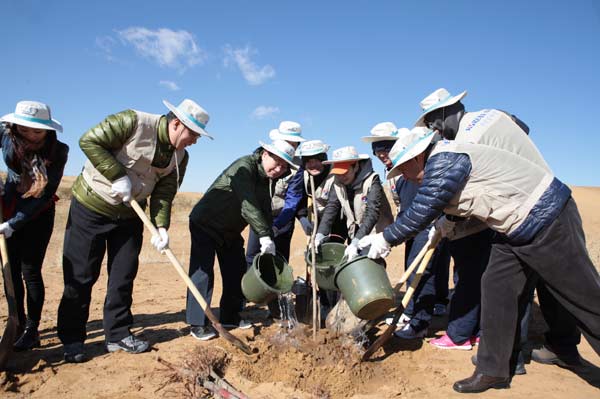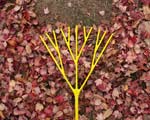Korean Air to carry out forestation in Kubuqi desert
(chinadaily.com.cn)
2012-11-06 14:35
|
|
|
 |
|
More than 65 employees from the South Korean flagship carrier Korean Air headed for the Kubuqi desert in China's Inner Mongolia autonomous region to carry out large-scale forestation, Oct 16, 2012. [Photo/chinadaily.com.cn] |
The desert affects the environment of neighbouring countries.
Chosun Ilbo, one of South Korea's major daily newspapers, once reported that the Kubuqi desert, which is more than 30 times the size of Seoul, was sending sandstorms to the Korean Peninsula every year. It said that many Korean companies were taking measures to tackle the problem.
From 2007 to 2011, Korean Air planted 1 million trees on a total of 3.18 million sq m of land to help prevent sandstorms and desertification in Northeast Asia.
"Korean Air will continue to carry out various forms of public environmental protection activities in order to repay the support and love of its Chinese passengers," said Chi.
The program is an important component of the South Korea-China Friendship Green Great Wall project, which is co-funded by the All-China Youth Federation and South Korea-China Future Forest, a non-governmental organization focused on forestation. The project aims to build up a 28 kilometers long forestation area measuring between three and eight kilometers wide.
The Kubuqi desert is not Korean Air's only target as it promotes eco-development. In November 2009, Korean Air gave out 5,000 eco-friendly bags to Beijing citizens to promote a greener lifestyle.
In July and October 2010, Korean Air sent its environment ambassadors dressed as Teddy Bears to Beijing Capital International Airport and Guangzhou Baiyun International Airport, distributing cards with environmental protection information on them to promote the concept of a low-carbon lifestyle.
From 2004, Korean Air has created 50,000 sq m of forest every year on the outskirts of Ulan Bator, capital of Mongolia. It has also planted trees in Los Angeles, in the United States, annually since 2009.
Korean Air now owns 148 aircraft and is one of the 20 biggest airlines in the world. Like many other Korean companies, it is making an effort to promote forestation and eco-friendly lifestyles in countries challenged by desertification, a move that benefits both those countries and their neighbors.
Ye Shiwen contributed to this story






